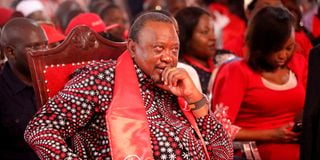Understanding Kenyatta’s lonely struggle in seamy underside of Kenya’s politics

Jubilee Party leader and retired President Uhuru Kenyatta during his party's National Delegates Conference at Ngong Racecourse on May 22, 2023.
How on earth did a putative political colossus, who vacated the presidency after a full decade’s term only eight months ago, end up in sordid confraternity with the vilest goons known to urban delinquency and political thuggery, who had no qualms rummaging his person and stealing his articles?
How did Uhuru Kenyatta, leader of the biggest party that has ever dominated our politics and saturated national and county governments with its officials, end up abandoned by his party’s delegation of elected leaders, and forced to borrow Raila Odinga’s ‘delegates’ to shield him from the wrath of his proteges, Sabina Chege and Kanini Kega?
There is no simple, direct exposition that can settle these questions summarily.
We have no choice but to use our utmost endeavour to understand Kenyatta’s political background and practice.
As I suggested last week, Kenyatta was a reluctant entrant into the helter-skelter of Kenyan politics. Although firmly of our time, he learnt his politics directly, at the feet of a Kenyan pioneer, Pan-African legend and global icon, the inimitable Mzee Jomo Kenyatta, who also operated under the aliases of Johnstone Kamau wa Ngengi and Johnstone Kamau at various seasons in his eventful life.
Now, Kenyatta the elder was a masterful performer, having tried his hand at acting, who combined the mysticism of his anthropological speciality, fiery rhetoric of a pan-African visionary, folksiness of an African tribesman of his era, deference for state authority typical of British colonial subjects, and a generous dose of draconian autocracy born of his wilfulness and ambitions to emulate.
This is the maestro young Kenyatta observed negotiating governance, geopolitics and the ethno-regional intrigue that constituted our post-independence politics.
It does seem that Kenyatta the younger was thoroughly impressed by his relative’s virtuosity, but not with the Sisyphean labours of politics and government.
It is now firmly documented that Kenyatta was visibly and vigorously averse to the idea of pursuing a career in politics. However, influential people in his life were too invested in the Kenyatta mythology to tell the heir apart from the founder. So he was lovingly dragged kicking and screaming, and adoringly tossed into a churning whirlpool teeming with hardened predators, red in tooth and claw.
His debuts into both parliamentary and presidential politics resulted in spectacular implosion and traumatic failure. His aversions and insecurities were affirmed and formed the political pathology which defined his new vision of leadership, governance and politics.
The Handshake
Thenceforth, Kenyatta pursued trauma-driven politics, through which he projected his fear of competition, dissent and criticism.
It is this projection which anchored a counterintuitive philosophy, spawning Kenyatta’s idiosyncratic definitions of peace, democracy and development, which were sedulously decanted, through the Handshake, into the Building Bridges Initiative, Kenyatta’s herculean effort to define a distinctive legacy.
Whilst explaining the Handshake, an anomalous political transaction which effectively extinguished political opposition, Kenyatta zealously reiterated that ‘peace’ was his overarching vision.
In this context, ‘peace’ was negatively propounded as the absence of dissent, criticism, protest or any other of the clamorous effusions that typify democratic animation. He wanted Odinga off the streets so that he could govern in ‘peace’.
When the BBI came to town, it became clear that political competition, checks and balances and accountability in government were going to be radically redefined, if not comprehensively dismantled. Development became synonymous with largesse in the form of vulgar pork-barrel dispensations administered through the ethnic chiefs who formed and controlled the government.
The idea that anyone can throw the best-laid plans into utter disarray as a matter of democratic right, and that other people’s interests, perspectives and agenda mattered in political leadership, and that at its core, democratic politics entailed elective competition by which candidates surrendered the ultimate decision to the hoi polloi, sat very oddly with Kenyatta.
The BBI collapsed in a sad heap. The Handshake ultimately delegitimised Odinga’s campaign, leading to his fifth defeat.
Kenyatta’s party, Jubilee, rapidly shrivelled into a husk, and he became the leader of a faction contending with a majority bitterly aggrieved by his confounded politics.
Although this is familiar territory for Kenyatta, there’s an added dimension. Instead of enjoying a pleasant retirement and the afterglow of a glorious legacy, he is wallowing in the monumental wreckage of spectacular failure, addled by the siren call of Odinga’s ‘peaceful protests’, and getting intimately acquainted with the deplorable menagerie which infests the seamy underside of crude politics.
In theory, Kenyatta is the sole author of his misfortunes.
Practically, he is merely enacting a tectonic internal struggle, between the immense shadow of his legendary father, the tremendous expectations that frequently overwhelm him, the paralysing anxieties and a haunting sense of inadequacy in defining moments, and most importantly, the ambivalent implications of his absolutely gargantuan surname.
It is a profound psychic turmoil whose resolution calls for extraordinary fortitude and composure, which cannot be found in the insalubrious milieus where delegates pick their leaders’ pockets.
Mr Ng’eno is an Advocate of the High Court of Kenya.





